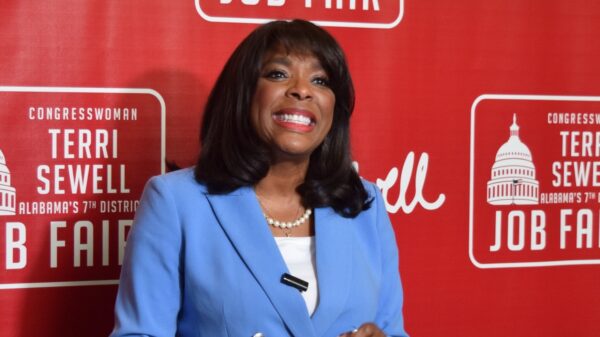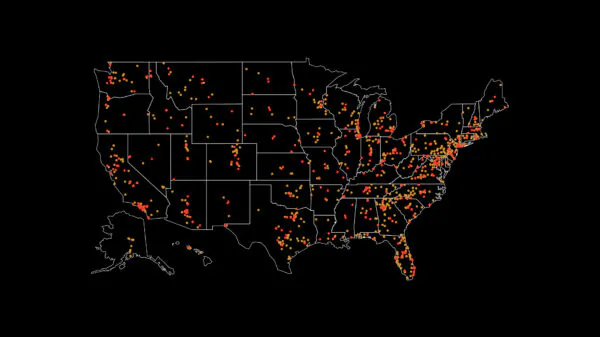Pornography and adult entertainment content are always canaries in the coal mine when it comes to regulating First Amendment rights unjustly.
OnlyFans models or a transgender porn studio are entitled to the same rights to free expression as a Baptist preacher or a Trump supporter attending a rally.
Consider these observations moving forward.
Conservative and right-wing populist state lawmakers across the United States have introduced proposals requiring age verification (AV) for adult websites in an effort to protect minors from viewing age-restricted content. The intention is admirable, but there is a sinister truth to all of this new push for child-proofing the internet.
The politicians touting these proposals, primarily far-right Republicans, rely on model bills and the lobbying efforts developed by far-right extremist organizations to pass.
Rep. Susan DuBose, R-Hoover, said that she intends to introduce such a proposal, according to Alabama Political Reporter this month.
Rep. Ben Robbins, R-Sylacauga, announced that he intends to reintroduce his age verification bill, also. Robbins’ age verification bill last legislative session proposed a verification mandate on adult sites with users from IP addresses in Alabama.
Robbins’ bill also proposed a regime where the companies that own adult websites must register with the state government. Robbins introduced the bill too late in the session and was rendered sine die at the time. Sen. Arthur Orr, R-Decatur, expressed interest in introducing age verification legislation in the Senate in 2024. It is unclear whether Orr and DuBose are backing Robbins’ bill.
And why wouldn’t they introduce these types of bills? Republican state lawmakers across the United States are following a political and legislative trend kicked off in Louisiana when an age verification requirement was placed on adult websites at the beginning of this year. Louisiana requires an adult website to integrate its systems with the company that develops the state’s digital government identification mobile app or deploy a so-called “reasonable” method to verify the age of users navigating to sites like Pornhub, xHamster, Xnxx, or Xvideos. Pornhub’s parent company, Aylo, deployed an integration with LA Wallet, the name of the government ID app, that asks users to submit a scan of a government-issued identity card in order to view porn.
Proponents of the porn ID laws say that this strategy is a non-invasive measure in preventing all minors from viewing content until they’re of the legal age in their respective jurisdictions. But, this is a foolhardy assumption given the U.S. Supreme Court has already declared that age-gating and segregating entire sections of the internet violated the First Amendment rights of both adults and youth. That decision was handed down in Reno v. American Civil Liberties Union when the high court found the Communications Decency Act of 1996 was unconstitutional. The Supreme Court also affirmed that the First Amendment protects legal and consensual pornography. But, it isn’t stopping a wave of bills based on the Louisiana law and model legislation circulated among right-wing groups. Alabama Daily News reported DuBose believes that passing age verification legislation in the legislature next session will result in a simple measure that would have very little effect on adults who consume legal pornographic content. In reality, the result will look a lot like what is happening in Louisiana, Utah, and Texas, which already have enacted AV laws.
Costly legal challenges, inconsistent enforcement, and unconstitutional censorship. That is the reality with these laws on the books. These conservatives don’t care. It’s a clear power grab. In previous writings, this journalist connected a well-funded and organized effort to outlaw porn to the onslaught of age verification proposals. Project 2025 is the intersecting point. Currently led by the Heritage Foundation, Project 2025 is a far-right astroturfing group presenting itself as the presidential transition team for a conservative Republican victory in the 2024 Presidential Race.
Groups involved with Project 2025 include Moms for Liberty and Alliance Defending Freedom. Note that those two groups are considered anti-LGBTQ or general hate groups by the Southern Poverty Law Center. Other groups classified as hate groups by the center include the American Family Association, the Center for Family and Human Rights, the fake church Family Research Council, and organizations that have employed individuals linked to other classified hate groups.
Organizations involved with Project 2025 additionally include anti-immigration hate groups and a variety of organizations not classified by the center that are just out of touch with the general American public. Not all of the groups involved with Project 2025 really care about the social conservatism or the accessibility of pornography on the internet because they’re simply private industry-backed organizations, like the Competitive Enterprise Institute or the Institute for the American Worker, looking to drawback the executive branch’s administrative regulatory power.
Not surprisingly, the Alabama Policy Institute is involved. But the fact remains that the most vocal of these groups are by far the most extreme. Project 2025 published an official guide for a prospective conservative win in 2024. It’s entitled Mandate for Leadership: The Conservative Promise and is over 900 pages.
In Mandate for Leadership, Heritage Foundation president Kevin Roberts spares absolutely no words. It’s quite appalling, to say the least. Roberts advocates for aggressive actions for the government to take against things that he and his allies view as “porn.”
“Pornography, manifested today in the omnipresent propagation of transgender ideology and sexualization of children, for instance, is not a political Gordian knot inextricably binding up disparate claims about free speech, property rights, sexual liberation, and child welfare,” says Roberts. “It has no claim to First Amendment protection.” He adds that porn’s “purveyors are child predators and misogynistic exploiters of women. Their product is as addictive as an illicit drug and as psychologically destructive as any crime. Pornography should be outlawed. The people who produce and distribute it should be imprisoned.” That’s alarming and false language.
Porn addiction is pseudoscience. There is a significant difference between legal porn and child sexual abuse material or non-consensual intimate imagery.
The First Amendment covers full rights of expression, including sexuality and bodily autonomy (e.g., abortion rights advocacy) so long a crime isn’t committed. The vast majority of porn is produced consensually between one or more adults.
While some dismiss his as blusterous rhetoric, Roberts actually depicts a frightening reality and future. The age verification proposals presented by dozens of lawmakers align with this extreme worldview Project 2025 advocates.
They use the child protection card, insinuating that the whole porn industry is directly targeting children. This is also a bald-faced lie, given the vast majority of adult entertainment companies work to keep minors from viewing adult content. The parent companies of adult entertainment websites like Pornhub and xHamster voluntarily report to the National Center for Missing and Exploited Children on their efforts to detect and prevent the circulation of child sexual abuse material. Most platforms also support age verification in some capacity, but only when these laws cover all platforms, including social networks and platforms with inappropriate content.
Age verification in the context of DuBose, Orr, and Robbins is alarming and signals to Alabama and the entire country that our rights to First Amendment-protected speech are at significant risk.





















































